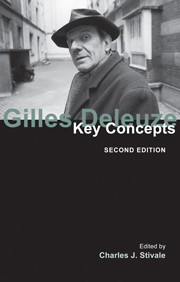2 - Expression
from PART I - PHILOSOPHIES
Summary
The concept of expression, or of “expressionism in philosophy”, first appears and is fully developed in Deleuze's longer treatise on Spinoza published in 1968, the same year as the publication of his systematic study, Difference and Repetition. Thus, both major works can be understood together as two different approaches to the idea of difference in the history of philosophy. The problem of expression in Spinoza's philosophy concerns, first of all, the interplay between the internal thought and external bodies, and how ideas come to express this relation between inside and outside as being internal to the power of thought. The problem that Deleuze first sets out to resolve through his reading of Spinoza is precisely what is present in a true idea that makes it adequate to or “expressive” of the thing's nature “as it is in itself ” (EPS: 15). The solution to the problem is found in Spinoza's radical principle of parallelism, in which the idea's expressive character is said to be immanent in things themselves, and it is the character of truth to express this immanence fully or perfectly. Although often ascribed to Spinoza's philosophy of parallelism, Deleuze derives a crucial part of this logic of expression from Stoic philosophy, and in particular, from the theory concerning the incorporeal nature of sense. However, the problem of expression is not restricted to Deleuze's commentaries on classical philosophers such as Spinoza, Leibniz, or Descartes.
- Type
- Chapter
- Information
- Gilles DeleuzeKey Concepts, pp. 33 - 43Publisher: Acumen PublishingPrint publication year: 2011



